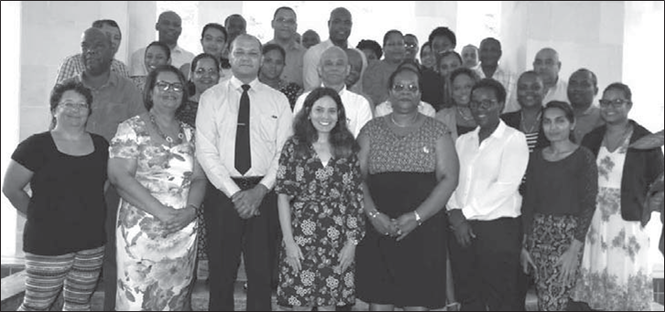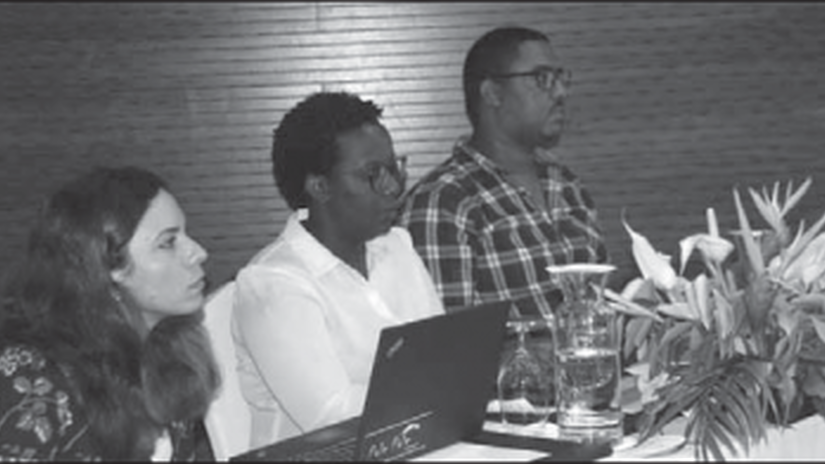
The changes are outlined in the proposed Disaster Response and Risk and Management Bill 2018. It include provisions which cater for border protection, protection of critical facilities such as cultural heritage sites, humanitarian protection, civil-military coordination, obligation of persons to supply information, information gathering and analysis, request for international assistance, protection from liability, compensation for loss or injury suffered by public officers and power to take control of land or property during hazardous events, emergency or disaster among other provisions.
These were tabled and discussed during a workshop organized by DRDM and the Red Cross Society of Seychelles with the collaboration and support of the International Federation of Red Cross and Red Crescent Societies (IFRC) headquarters, based in Nairobi, Kenya. The aim of the two-day workshop was to share progress in the field of disaster law over the past decade, equip authorities with knowledge of International disaster response law, and other disaster law tools, stimulate discussion on the content of the National Disaster Management Act 2014 and the Proposed Disaster Response and Risk and Management Bill 2018 amongst others.
Trevor Louise, Principal Disaster Management Officer, DRDM revealed that the process of revising the Disaster Management Act started in 2018 and the draft document of the proposed amendments were forwarded earlier this year to the African Union, the Southern African Development Community (SADC) and the International Federation of Red Cross for comments and to assist with aligning the proposed Act to the SENDAI Framework.
It is to be noted that the Sendai Framework for Disaster Risk Reduction 2015-2030 is the first major agreement of the post-2015 development agenda, with seven targets and four priorities for action. It was endorsed by the UN General Assembly following the 2015 Third UN World Conference on Disaster Risk Reduction. Louise notes that DRDM must make sure that Seychelles is in line with frameworks and other international norms thus the workshop. “We have new alignments which will be catering for people with special needs and that includes women, children and people with disabilities. When reviewing the law, we had to check on the conventions on the rights of children and women and the minimum standards and rights which all came into consideration as well as climate change adaptations,” explained Louise further adding that the new amendments are put in such a way that when delivering the Acts, the rights of those mentioned are not infringed or anyone else for that matter.
He also noted that the previous Act did not necessarily pose challenge for DRDM in executing its mandate but rather the new amendments seek to review how they operate such that it is in accordance with national laws and international regulations. A presentation by Louise showed the proposed provisions are flexible and some of the benefits include powers of the department will be conferred to the “head of the department “and not to a specific position or person, as it is in the current Act, the roles of the department and other MDAs will be clearer and this will allow for better coordination between key stakeholders, the officers of the department and other first responders will be protected under the law from liability and also for any loss and/or injury suffered. The law will ensure that the respective MDAs will be more accountable and transparent and will provide space for monitoring and evaluation of the programmers and services being offered.

Picture: Maria Martinez, Stella Ngugi and Trevor Louise
Key legal issues in disaster risk management
Speaking on this topic, Stella Ngugi – Disaster Law Programme Officer at the IFRC Africa Region said this should be put in place before an emergency happens or before aid comes in. She said there is a need to make sure that agencies responsible are able to support the beneficiaries, control and manage what happens during the emergency phase when aid is coming in the country, especially, if it is aid that is too big for the government to handle, not because they do not have the capacity but depending on how much the disaster has affected the population and also the phase after, which involves how to build on the recovery and the resilience of the population that has been affected. “The national government has the primary role at all times to be able to dictate what’s going on and though international humanitarian workers are coming in and they have their rights, they also have responsibilities and are accountable to the national government which they are working for. So, they must make sure that they are coordinating,” she highlighted.
Ngugi also noted that generally, there have been challenges when aid is coming in various countries. She asserted that bringing aid involves crossing borders and each country has its sovereign responsibility to protect its border.
Ngugi asserted that she would like the Red Cross Societies to continue the supporting role that they have with the national government, “and the auxiliary role that they have as a technical advisor to the national government is very important. It is unremarkable that in this time we are living in where climate change is affecting the country, despite already having a Disaster Management Bill, we want to see it adapting to the current context of the country. As a small island state, Seychelles is adversely affected by climate change more than other inland countries and so the work they are doing is commendable. I hope they can impart the legislation that is being developed in years to come.”
The workshop was held on Thursday, 22 August and Friday, 23 August at Savoy Resort and Spa. Following the comments and suggestions made in this workshop, DRDM will be compiling a report with the help of the International Federation of Red Cross before proceeding with the validation of the draft Act.